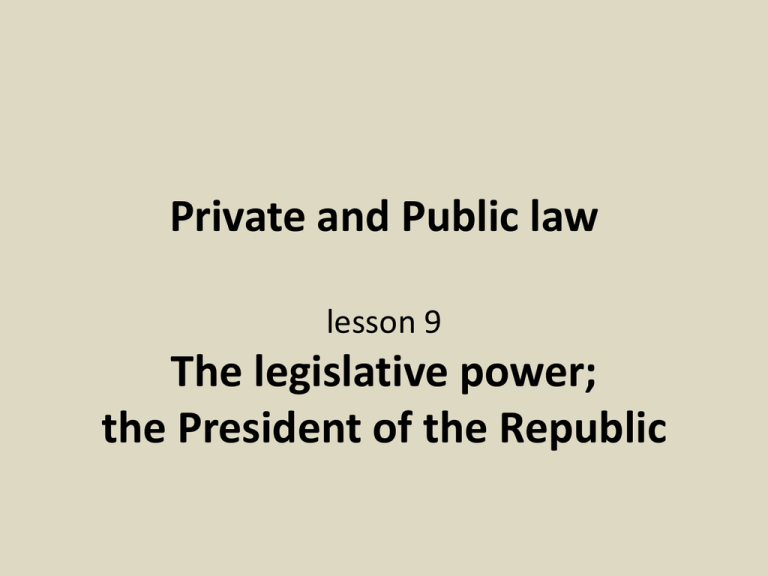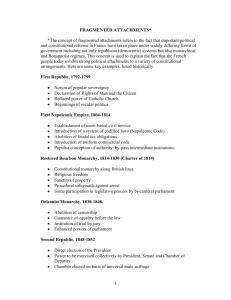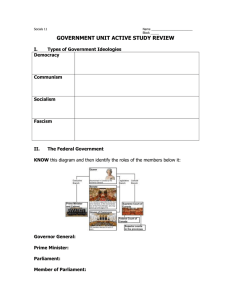Private and Public law The legislative power; the President of the Republic
advertisement

Private and Public law lesson 9 The legislative power; the President of the Republic The President of the Republic ___________________________ The President of the Republic _________________________________ He/she is elected by both Chambers of the Parliament jointly <> France analogous to Switzerland, USA and Germany The President of the Republic _________________________________ Eligibility requirements: - Italian citizen - age: 50 years old at least - entitled to civil and political rights The President of the Republic _________________________________ Term: 7 years why? Independence from the political majority views (Parliamentary term: 5 years) The President may be re-elected The President of the Republic _________________________________ Early termination: - [elapse of the 7 year-term] - death or voluntary resignation - loss or forfeiture of any requirement to take office / hold the charge (e.g., loss of the Italian citizenship) - he/she becomes permanently unable to perform his/her duties The President of the Republic _________________________________ Is the charge held by the President compatible with any other public charge? - Mayor? - Member of the Parliament? - Member of the Government? The President of the Republic _________________________________ May/should the President be replaced? - on a temporary basis (art. 86 of the Italian Constitution): are missions abroad also included in the definition of “temporary inability” to hold the charge? - on a permanent basis * Is the President of Senate entitled to carry out any act? Is the power to replace the President absolute? The President of the Republic _________________________________ - temporary inability President of the Senate - permanent inability President of the Senate + elections must be convened to appoint a new President The President of the Republic _________________________________ The only precedent regarding permanent inability: 1- the General Secretariat of the President sent a notice to the Prime Minister and the Presidents of the Chambers, regarding the President health conditions 2- the Prime Minister and the Presidents of the Chambers declared that the President of the Senate should hold the charge as President (art. 86) 3- the President health conditions turned out to be worse than expected: the Parliament was convened to acknowledge the “permanent inability” of the President 4 – the President voluntarily resigned The President of the Republic _________________________________ Is the President politically/legally responsible? - political liability - legal liability The President of the Republic _________________________________ political liability - he/she is not politically liable. Liabilities are incurred by the competent Minister and by the Prime Minister - Each Presidential Decree must be signed by the competent Minister - Art. 279 of the Criminal Code was repealed in 2006 The President of the Republic _________________________________ Legal liability with regard to the acts done by the President while performing his/her duties, the President is not legally liable (even from a criminal law viewpoint, unless for “high treason” or “attempt to attack the Constitution”). As a private individual, the President may be held liable, but he/she may be only prosecuted after the elapse of his/her term (provided that the applicable statutory limitations have not elapsed yet) The President of the Republic _________________________________ “high treason” or “attempt to attack the Constitution”: - they are not contemplated by the Criminal Code. The principle of non-retroactivity of criminal law does not apply to the President - both Chambers of the Parliament must resolve upon the accusation (absolute majority) - the Constitutional Court is entitled to make a judgment The main powers of the President _________________________________ - in connection with the legislative power he/she declares political elections / referendums open; he/she may appoint five senators in charge for an unlimited period of time; he/she may deliver speeches / messages to the Parliament; he/she may suggest a second-reading of a draft new law - in connection with the administrative power he/she appoints the Prime Minister and, upon suggestion of the latter, each Minister; he/she ratifies international treaties; he/she is formally head of the Army; he/she settles disputes arising from “extraordinary petitions”; he/she may revoke Mayors from charge - in connection with the Courts’ function he/she appoints five members of the Constitutional Court; he/she is head of the High Council of Magistrates (CSM); he/she may grant “pardon” The President of the Republic _________________________________ In particular: the declaration regarding the opening of political elections - uncured conflict between the Government and the Parliament (“mozione di sfiducia”) - facts or circumstances clearly highlighting that citizens no longer support the Government / majority activity The President of the Republic _________________________________ In particular: the declaration regarding the opening of political elections - The President must hear the opinion of the President of each Chamber of the Parliament, even though this is no binding opinion - The President may not declare the opening of elections within the last 6 months of his/her term The Parliament ___________________________ The Parliament _________________________________ Each member of the Parliament “represents the Nation” (art. 67 of the Constitution): does this imply any “power to represent” electors? What does “representative” mean? This is something different from the figure regulated by Art. 1387 of the Civil Code (“rappresentanza”): electors are not entitled to revoke the “representative” the relationship is set up only between electors and representatives, there is no “third party” members of the Parliament are not bound by any mandate (art. 67) Members of the Parliament only represent a “theoretical” entity (the Nation), not their electors The Parliament: the electoral systems _________________________________ “maggioritario”: the seats allocated the relevant district are “granted” to the candidate acquiring majority of votes (absolute / qualified majority) “proporzionale”: each candidate is granted with a number of seats proportionate to the number of votes cast in his/her favor The Parliament: the main differences between the two Chambers _________________________________ - different age requirements apply to elect and to be elected - the number of members is different - the applicable electoral systems are different - all members of the House of Representatives are elected, while some members of the Senate are appointed by the President of the Republic or are automatically declared as members of the Senate (e.g., former Presidents of the Republic) The Parliament: the recent Constitutional reform ______________________________________ Complaints about the identity of functions of the Chambers (unless merely procedural aspects are considered) Proposals regarding reduction of the number of seats / abolishment of the Senate / its transformation into a “Regional Senate” / “Senate based on territorial autonomies” But is “Regional Senate” something really new in the Constitution? The Parliament: the recent Constitutional reform ______________________________________ Article 57 of the Constitution: “The Senate is elected on a regional basis. The number of Senators to be elected is three hundred and fifteen […]. No region may have fewer than seven senators; Molise shall have two, Valle d'Aosta one. The allocation of seats among the regions, in accordance with the provisions of the preceding Article, is made in proportion to the population of the regions […]” The Parliament: the recent Constitutional reform ______________________________________ What does the expression “on a regional basis” mean? There must be a close connection between the Parliament and Regions (these are not regarded as territorial entities, separate from the central State, but as local communities of people) The Parliament: the recent Constitutional reform ______________________________________ The reform envisages: - reduction of the number of seats - “transformation” of the Senate into a “Regional Senate” / “Senate based on territorial autonomies” - functions of each Chamber have been better specified and overlapping should be avoided (e.g., a Chamber may legislate, the other may have supervisory functions); abolishment of “shared” competences - streamline Parliamentary regulations: better selection of proposals and projects of law The recent Constitutional reform: the Senate will be only comprised of Mayors and members of Regional Councils; the current House of Representatives should remain the only “political” Chamber Objections: according to the Reform, the House of Representatives should be governed by an electoral system granting an extra-quota of seats to the majority (“maggioritario”); on the other hand, members of the Senate would not be elected by citizens anymore. Therefore, minorities might not be adequately represented. Senators should be elected by citizens (the number may be reduced by a third); Presidents of Regions may participate to debate within the Senate with no voting rights; the Senate should have territory-related competences and general supervisory functions (and powers regarding relationships with the EU)

